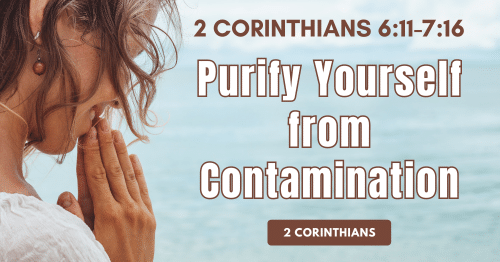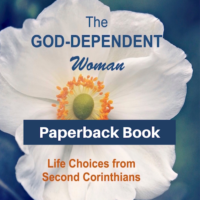2 Corinthians 6:11-7:16 • Purify Yourself from Contamination

AI was not used to generate this post.
How do you recognize when you are being contaminated in body and spirit by a relationship or activity? What should you do about it? This is post #7 in the God-Dependent Woman blog series. In the last post, we looked at the gifts we receive from God as new creations in Christ, including having a new perspective of people and having a new purpose for life. In this post, we will look at 2 Corinthians 6:11-7:16 to learn how to purify yourself from contamination by ungodly, immoral, and reputation-ruining relationships and activities.
Key Takeaways
- Recognize contamination in body and spirit caused by ungodly relationships and activities.
- Avoid being unequally yoked with unbelievers to prevent spiritual contamination.
- Repentance and godly sorrow are essential for dealing with sinfulness and maintaining purity.
- Depend on God for strength, recognizing that our capabilities arise from Him, not our own power.
- Live as a God-dependent woman, trusting in God’s comfort, truth, and guidance.
Remember Who You Are
You are the beloved child of the living God who, in His love, has made you into a new creature with a definite purpose. You are the aroma of the knowledge of God for others to sense. You are a righteous light-bearer of God’s glory that shines even in your weakness. You are able to view other people through the lens of their relationship to Christ or need for Him rather than through worldly prejudices. That is who you are, dear Christian, in God’s eyes—the only view that really matters.
Yet, our frail bodies live in a world filled with struggles. People around us see how we respond and may be drawn to Christ by watching us live with integrity and sincere dependence on the Lord Jesus.
Contamination from Association
Do not be yoked together with unbelievers. For what do righteousness and wickedness have in common? Or what fellowship can light have with darkness? What harmony is there between Christ and Belial (Satan)? Or what does a believer have in common with an unbeliever? What agreement is there between the temple of God and idols? For we are the temple of the living God. (2 Corinthians 6:14-16)
The danger of being unequally yoked
Paul is describing the condition of being unequally yoked. This refers to the disastrous results of yoking a bigger, compliant ox with a smaller, stubborn donkey together (Deuteronomy 22:10). The pairing does not work to accomplish what you are trying to do.
Paul used several contrasting word pictures to paint the incompatibility of believers being yoked with unbelievers. And his descriptive joining words emphasize that righteousness and wickedness have nothing in common. There can be no fellowship, harmony, or agreement between those who are joined to Christ and those who are joined to the world. The general answer to all the questions Paul asks would be, “Nothing!”
This section of text summarizes 1 Corinthians 10:1-22, where Paul had previously warned the Corinthians about idolatry. This warning extends to relationships as well as behavior. From the original language, we learn that Paul is addressing individual believers. But we know that individuals by their choices influence the whole community.
Being yoked together applies to partnership in dependent relationships where you are relying on the other person to represent you and Christ well, but they cannot. As in 2 Corinthians, it would be letting worldly influencers and teachers guide you in how to live life. Think marriage covenants, business partnerships, close friendships, and spiritual guidance. It can also refer to whomever you choose to support and promote publicly.
Consider how detrimental such influences can be on you as a believer. You could get swept into doing things you don’t want to do. You might be under continual stress to stay uncontaminated and remain faithful to Christ. Such relationships could result in you being wronged, corrupted, or exploited. It definitely puts a stumbling block in your role as an ambassador for Christ. It is more likely you will be spiritually defiled than the other party would be spiritually enriched.
What is the answer to this dilemma?
Prevent being yoked to unbelievers
What should do to prevent yourself from being unequally yoked? The answer comes at the beginning of chapter 7—purify yourself from contamination.
Therefore, since we have these promises, dear friends, let us purify ourselves from everything that contaminates body and spirit, perfecting holiness out of reverence for God. (2 Corinthians 7:1)
To purify yourself from everything that contaminates body and spirit means to separate yourself from ungodly, immoral, and reputation-ruining activities. Ask people to pray for you to get out of the yoke if it is a business partnership or a close friend. Ask questions about the one who is influencing you. Are they following Christ or the world? Remember who you are and whom you serve when entering a binding relationship with someone. Make pre-decisions that you won’t let an unbeliever be the dominating influence in your life or work before getting caught in that situation.
What about our role as aromas for Christ and light-bearers of the good news to others? I like what long-time professor Tom Constable said about this,
Paul was not saying that Christians should break off all association with unbelievers (cf. 1 Corinthians 5:9-10; 10:27). He had previously encouraged the saved partner in a mixed marriage to maintain the marriage relationship as long as possible (1 Corinthians 7:12-16). He had also urged his fellow Christians, as ambassadors of Christ, to evangelize the lost (2 Corinthians 5:20). Rather, here Paul was commanding that Christians form no binding interpersonal relationships with non-Christians that resulted in their spiritual defilement. … Such alliances can prevent the Christian from living a consistently obedient Christian life. (Dr. Constable’s Notes on 2 Corinthians 2017 Edition, p. 74)
Ask the Lord to show you when you are being contaminated in body or spirit by an activity, relationship, or association. Flee, don’t flirt with corrupting influences of the secular culture. I heard someone describe the differences between those two actions this way:
- Flirting with it would be considering, “How close can I get to the line of sin without crossing over?”
- Fleeing from it would be considering, “How far away can I get from the line of sin so I am not close enough to cross over?”
We often put more effort into being “anti-germ” than we do in being “anti-sin.” Consider the corrupting influences from the secular culture to be as dangerous to your health as the presence of germs in your space.
Contamination from Holding onto Sinfulness
Refusing to repent
Hanging onto sinfulness in your life also contaminates you. Earlier in this letter, Paul identified sinful actions of certain Corinthians and brought those to the attention of the whole congregation. Later in his letter, he said this,
For I am afraid that when I come I may not find you as I want you to be, and you may not find me as you want me to be. I fear that there may be discord, jealousy, fits of rage, selfish ambition, slander, gossip, arrogance and disorder. I am afraid that when I come again my God will humble me before you, and I will be grieved over many who have sinned earlier and have not repented of the impurity, sexual sin and debauchery in which they have indulged. (2 Corinthians 12:20-21)
Paul was concerned about those who were holding onto their sinfulness.
As long as you live in your earthly body, you will be tempted to sin. Sin will happen—whether intentionally or unintentionally. Though our God is no longer counting our sins against us (2 Corinthians 5:20), we still must deal with the consequences of any sinful behavior. Addressing recognized sin in your life is part of dependent living. The proper response when you recognize that sin is to have godly sorrow about it.
The blessing of godly sorrow
Even if I caused you sorrow by my letter, I do not regret it. Though I did regret it—I see that my letter hurt you, but only for a little while—yet now I am happy, not because you were made sorry, but because your sorrow led you to repentance. For you became sorrowful as God intended and so were not harmed in any way by us. Godly sorrow brings repentance that leads to salvation and leaves no regret, but worldly sorrow brings death. See what this godly sorrow has produced in you… (2 Corinthians 7:8-11, first part)
Godly sorrow is sorrow that leads to repentance. Repentance is changing your mind about that behavior, admitting that it causes God pain, and mourning that. Godly sorrow is not harmful and leaves no regret because it is God-focused rather than self-focused. You mourn the sin, not just getting caught doing it. That reveals your heart before God.
Worldly sorrow is just saying that you are sorry without no accompanying life change. It is basically saying, “I got caught. Bummer. Sorry.” There is no intent for change. It is not just confessing that you did it.
Repentance isn’t repentance until you change something. You can confess “until the cows come home” (daily, habitually) and never change anything. Jesus called for people to “repent” not “confess.”
The difference between godly sorry and worldly sorrow is obvious. One mourns the sin and leads you closer to God. The other mourns getting caught in the sin and may lead you to a hardened heart toward God because you got caught. The latter allows you stay contaminated by sin and not released from it. God wants you to be released from your sin. That action is called redemption.
The Biblical Process for Dealing with Recognized Sin
Whenever the Spirit convicts you of thinking or behavior that is definitely not pleasing to the Lord (2 Corinthians 5:9), follow this biblical process to deal with it:
Step One: View yourself rightly. Your identity is not “_______” (coveter, grumbler, gossiper, whatever it is). You are in Christ, a child of God, who sometimes “_____” (covets, grumbles and complains, gossips).
Step Two: Recognize (confess) the truth regarding your sin. To confess biblically means to agree with God about what you and He both know to be true. Confession is not a formula, a process, or dependent on a mediator. Regarding sin in my life, it is not saying, “I’m sorry.” It is saying, “I agree with you, God. I blew it!” See your sin as awful!
Use grumbling as an example: You read Philippians 2:14, “Do everything without grumbling or arguing.” The Spirit convicts you that you grumble and complain a lot. You agree with God that your grumbling is not pleasing to Him—in fact, He hates it. Grumbling doesn’t fit someone who is in Christ, representing Christ to the world. That is confession.
Step Three: Confession is incomplete without repentance. Repentance means to change your mind about that sin, to mourn its ugliness, resulting in changing your actions. Paul calls that godly sorrow in 2 Corinthians 7:9-11, and he says godly sorrow produces repentance. It is saying, “I recognize what I am doing is wrong. This fills me with sorrow because it displeases You, God. Please help me to live differently.” He will certainly do that! God uses sorrow over sin to get His desired results. That is how our lives get transformed.
For grumbling: You want to live in order to please God, and God wants you to stop grumbling and complaining. It comes from a heart that feels entitled and not grateful. So, you pray, “Lord Jesus, please have your Spirit nudge me when I am grumbling and complaining. Help me to say no to the temptation and to give up that habit of being ungrateful. By faith, Lord, I want you to do that in my life.” That is repentance.
Step Four: Repentance leads to dependence. Depend on the living Christ inside you for that change to take place. Our Lord Jesus Christ is not interested in our compliance (outward conformity) as much as He desires our obedience from the heart. And trust in Him to help you overcome the consequences of any sinful choices you have made in a way that brings glory to Him.
For grumbling: Memorize Philippians 2:14 and James 5:9 and any other scriptures that deal with not grumbling and being grateful instead. Be sensitive to the Spirit’s nudging when you are tempted to do that. Desire a life that pleases God. It’s okay to say, “Lord Jesus, I can’t do this on my own. I trust you to do this in me and through me.” Then, watch what He does! That is dependence.
Download this bookmark that contains the Biblical process for dealing with recognized sin.
Don’t let deliberate sin continue to contaminate you and keep you from enjoying a close, dependent relationship on your loving, holy God.
As Paul wrote in 2 Corinthians 7:1,
Therefore, since we have these promises, dear friends, let us purify ourselves from everything that contaminates body and spirit, perfecting holiness out of reverence for God.
Amen. Don’t delay. Deal with that sin in your life today.
You learn how to do this as you act in obedience to the Word of God, depend on Jesus Christ for the power to do so, and trust Him with the results.
Does God give the hardest battles to His strongest soldiers?
Now, to evaluate our saying for this blog. This is it, “When you are having a rough time, just remember that God gives the hardest battles to His strongest soldiers.” True or false?
You have probably heard this saying before today. And any graphic with this saying on it might be accompanied by a picture of wonder woman with Bible Verses attached about being strong in the Lord.
Does God give the hardest battles to His strongest soldiers? The Corinthians had a lot of tough battles, and they were definitely not God’s strongest soldiers. Very few of us feel like God’s strongest soldiers when we are facing a huge challenge such as Stage 4 cancer, infertility, a disability that prevents us from working to use our God-given skills, or a child born with severe birth defects.
Going back to what we have learned in 2 Corinthians so far, we are all jars of clay. Weak. Frail. God puts His treasure, Himself, in all of us because we are all weak, and He wants us to know that any power to fight a battle is from God and not from us. Our strength comes from being clothed in Christ not as wonder woman. Delete that saying from your Facebook feed.
Reasons Why God Wants Us to Depend on Him More Than on Ourselves
From our passage, here are some reasons why God wants us to depend on Him more than on ourselves:
- We are His children. (6:16-18)
- To purify ourselves to perfect holiness. (7:1)
- He comforts us when we are downcast. (7:6)
- So we rightly respond to sin in our lives. (7:9)
- To see truth in ourselves, in our hearts. (7:12)
Let Jesus satisfy your heart with confidence that you can depend on Him. Then, live each day as a God-dependent woman!
Read all the articles in our 2 Corinthians series. In the next post, we will learn how we can trust God’s purposes for His provision to us.
All of the above information is covered in The God-Dependent Woman Bible Study covering 2 Corinthians in the New Testament.
AI was not used to generate this post.


